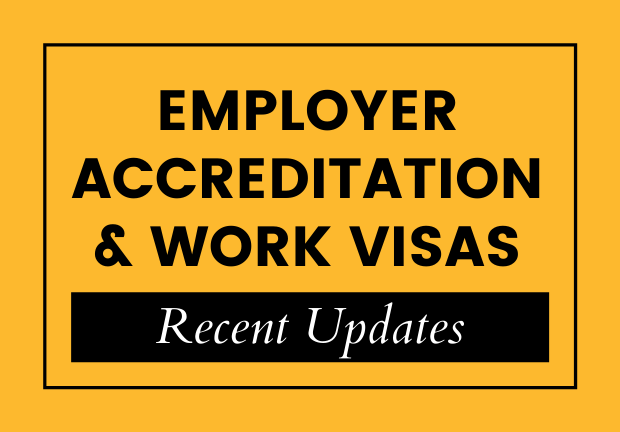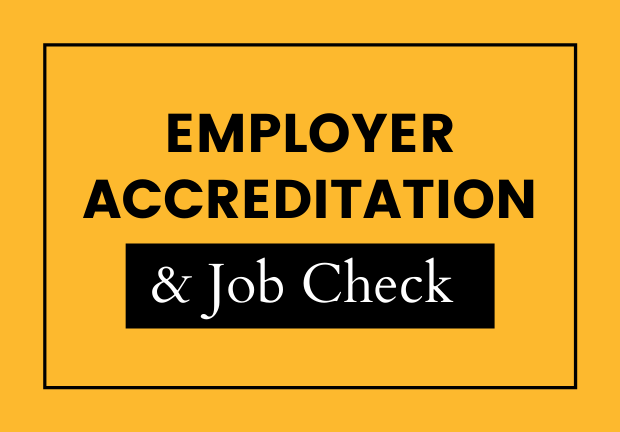Work to Residence Visas End in 2 Months - Accredited Employers, Act Now!
02 September 2021With all the announcements and updates that Immigration NZ has released this year - and then the modifications to those updates - it’s easy to lose track of what needs to happen by when, and what the consequences might be if deadlines are missed.
Think of the upcoming Accredited Employer Work Visa and the employer-led accreditation system. Both of these policies were meant to begin 1 November 2021, but were then pushed out to mid-2022 - with official dates yet to be announced. And although you might expect that the deadline to apply for the visas contingent upon these policies would be pushed back to mid-2022 as well - this is not the case.
October 31 is the official end date for two visa types that fall under the Work to Residence category.
About the Impacted Work to Residence Visas
The change to two of NZ’s most common Work to Residence visas means that applications for these visa types will no longer be accepted after 31 October 2021. So, individuals who want to apply for these visas - as well as the employers who want to ensure their employees are on an approved pathway to residence - must act quickly.
Eligibility Requirements for the Impacted Visas
The Talent (Accredited Employers) Work Visa:
This work visa can be granted to applicants who:
- Are 55 years or younger
- Earn at or above $79,560 p.a
- Work full time with an employer that already holds ‘Accreditation’ granted by INZ - working in the employer’s core area of business and holding an offer of employment for at least 24 months
The Long Term Skill Shortage List (LTSSL) Work Visa:
This work visa can be granted to applicants who:
- Are 55 years or younger
- Have the specified work experience, qualifications and occupational registration to work in an occupation on the LTSSL list
- Hold an offer of employment for at least 24 months, in an occupation that is included on the LTSSL at the time that their application is made and that meets the specifications for that occupation
Each of These Visas:
Each of these visas, which are granted for 30 months at a time, allows the applicant to apply for residence after 24 months of holding the visa and working for an accredited employer. Thus, after 31 October 2021, these direct and highly sought after residence pathways will permanently close. Anyone who has managed to jump on to these Work to Residence pathways before 31 October 2021 will retain this route to residence, but those who miss it, will miss it forever.
Impacting Individual Applicants and Employers Alike
For individual applicants: If you were/are hoping to apply for either of these two Work to Residence visas: You have only until the end of October to get your application submitted. It is imperative that you move quickly, but also make sure you submit your application properly - this may be your only chance to secure a pathway to residency.
If you’d like to apply for either of these visas before the deadline, contact us to get started.
An Opportunity for Already Accredited Employers
Although it may seem that the onus is on the individual applicants to act quickly, the impact of this policy change could be significant for you as well:
Being able to offer an employee a pathway to residence could help you retain your staff. Considering the current shortage of skilled workers in NZ, ensuring your workers are on a Work to Residence visa offers them more certainty about their future in NZ, and could incentivise them to continue working for you.
If you have staff that are not currently on the Talent visa and their current salary is close to the income threshold of $79,560 p.a.: You may want to consider the benefits your company could realize simply by putting your employees in a position to apply for this work visa before it disappears.
If you have staff not currently on the Talent visa whose salary does meet the income threshold: These employees should consider applying for this work visa now. This could include staff who previously were on Essential Skills or open work visas, but after a pay raise are now earning at or above $79,560.
While you should definitely consider having a conversation with employees who appear to meet the criteria for this visa, there are are a few things to keep in mind:
- HR teams often lack the resources and knowledge needed to navigate such complex immigration conversations. In an already time-sensitive situation, having to hold this conversation - and understand the intricacies of different employee backgrounds - would not only add more pressure to your team, but would also take HR away from their more standard responsibilities. Because it is such an urgent situation, this should not be treated as a training opportunity for your HR team - it should be handled accurately and immediately. We can review - or help your team review - your entire immigration portfolio, including the options and potential pathways available to your migrant employees.
- Businesses - and HR teams - are legally able to provide immigration support but not immigration advice. And unfortunately for well meaning HR employees, there’s an incredibly fine line between the two. In fact, HR employees may not may not even realise that they have unknowingly provided immigration advice. Note that per NZ law, professional immigration advice can only be provided by licenced immigration advisers or lawyers.
- You - as one of just 1771 currently accredited employers - are running out of time to take advantage of your elevated employer status. Once the new employer accreditation scheme is officially in place, everyone will be on the same playing field. And even though the new accreditation scheme won’t begin until mid-2022, the ability to get your employees on the Talent Visa - which is the greatest advantage of your current accreditation - will disappear in less than two months. It’s a “use it or lose it” situation, and we strongly encourage you to use it!



.jpg)
